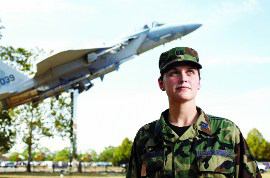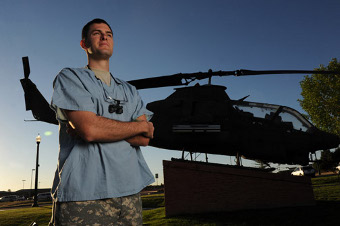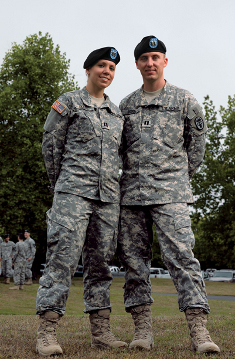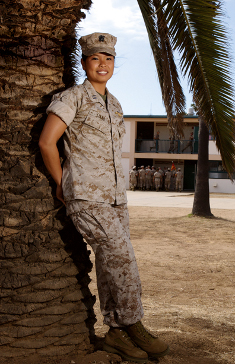Dental Force
By Jacqueline Mitchell
In a mammoth “group practice,” military dentists tend to the nation’s 2.4 million Marines, sailors, soldiers and airmen

“The military life is not always an easy one,” says Air Force Captain Christina Pflipsen, D10, at Wright-Patterson Air Force Base in Ohio. “It helps if you have a sense of adventure and a desire to serve those serving our country.” Photo: Ian Londin Photography
While other members of the dental school class of 2010 were wielding mirrors and drills at their new jobs or finding their way in their residencies this summer, Alexis Apatoff was getting the hang of firing an M-16. In June, Apatoff was commissioned as a captain in the U.S. Army, and after six weeks of basic training, she headed to Fort Jackson, in South Carolina, where she will provide oral health care to new recruits for the next three years.
“A lot of my patients will probably not have seen a dentist in a long time, if ever,” says Apatoff. “I’m excited because I will be doing a service for these new soldiers.”
Apatoff is one of 19 members of this year’s graduating class at Tufts University School of Dental Medicine to enter the military. Eleven joined the Army; seven went into the Navy, which also provides medical and dental care for the Marine Corps; and one joined the Air Force. All took advantage of the F. Edward Hébert Armed Forces Health Professions Scholarship Program (HPSP), which offers full tuition, as well as a $2,060 monthly stipend, to medical, dental, veterinary and nursing students in exchange for their service as commissioned medical officers after graduation.
Created under the Uniformed Services Health Professions Revitalization Act of 1972, the HPSP is the primary pipeline for training health professionals to care for those who work for the nation’s largest employer: the 2.4 million active-duty National Guard and Reserve personnel in the U.S. military and their 1.9 million dependents. Another 2 million retirees and their family members also receive benefits.
With almost 80 percent of U.S. dental students graduating with debts totaling more than $100,000, the HPSP is certainly an attractive offer. But in addition to the financial perks, the Health Professions Scholars from Tufts School of Dental Medicine say the opportunity to practice dentistry without the administrative headaches that go along with running a private practice is also appealing. There are no overhead costs for running a business, and all their patients have dental insurance.
“Being an Army dentist allows you to focus most of your efforts on patient care,” Apatoff says. “I like the idea of being able to perform the needed treatment without worrying if the patient’s insurance will cover it.”
Access to comprehensive dental care isn’t simply a perk of military service. Good oral health has been considered a crucial component of national security since at least World War II, when, in the months that followed the attack on Pearl Harbor on December 7, 1941, recruiters had to turn away one out of every 10 would-be soldiers because they lacked the six opposing teeth required for military service. Even among soldiers already serving, tooth decay was so rampant that the armed forces enlisted 20,000 dentists—more than a quarter of the nation’s practicing dentists—and dispatched them overseas to tend to the troops.
Once the war ended, military and political leaders realized that bad teeth were compromising the nation’s combat readiness. On June 24, 1948, President Harry Truman ushered in the age of preventive dentistry when he signed the National Dental Research Act, designed “to improve the dental health of the people of the United States” through a research effort led by the newly created National Institute of Dental Research (now the National Institute of Dental and Craniofacial Research of the National Institutes of Health).
However, more than 50 years later, “dental readiness” remains a problem for the armed forces, likely the product of twin deficiencies: limited access to care in many regions of the country and the lack of dental insurance or the ability to pay for care out-of-pocket. A 2002 Department of Defense study found that 34 percent of military personnel required dental care before they could be deployed.
In 2008, more than half of all new recruits needed urgent or emergency dental care that made them “undeployable,” according to the DOD. With the United States involved in two long-running wars, in Iraq and Afghanistan, military dentists safeguard not only their patients’ well-being, but that of the nation as well.
A Deserving Patient Population
Some of this year’s crop of Tufts Health Professions Scholars come from military families; others are first-generation officers. But the chance to take care of the men and women “who have committed to serving our country” is special, says Apatoff, whose parents were in the Coast Guard. “You couldn’t ask for a more deserving patient population,” she says.
Her classmate, Christina Pflipsen, a self-described Army brat who is now a captain in the Air Force, stresses that financial aid can’t be the main motivation in applying for an HPSP grant. “I think you will be unhappy if you do it solely for monetary reasons,” she says. “The military life is not always an easy one. It helps if you have a sense of adventure and a desire to serve those serving our country.”
“Not being in debt is a plus,” says Emily Dodds, D10, who serves in the Army with her husband, Dustin Dodds, D10. Both were Health Professions Scholars. “But I feel inspired by the other health professionals I meet who would do anything to help a soldier in need,” she says.
“A new dental graduate is missing experience. The military is a good way to get experience,” says Charles Rankin, D79, DG86, D08P, DG11P, a professor of endodontics at Tufts.
He should know. Rankin joined the Air Force in 1968, at age 18, long before he considered becoming a dentist. “I thought I might be an air traffic controller,” he says. “They made me a dental assistant.” When he returned home from military duty in Texas, London and Germany, Rankin earned his biology degree under the GI Bill and then applied to dental school. “There was no way I could pay for Tufts, so I applied for this [HPSP] scholarship,” Rankin says.
More recent HPSP students tell a similar story. “When I interviewed at Tufts, one of my fellow interviewees asked how long it takes to repay loans,” Pflipsen says. “The answer was 10 to 15 years. So I signed up.”
Roughly 700 Health Professions Scholars graduate from medical, dental, veterinary and nursing schools each year. More than 500 enter the Army, about 85 choose the Navy, and roughly the same number join the Air Force. The HPSP offers one- to four-year scholarships, depending on the branch of the military in which students enlist. Applicants must be U.S. citizens and meet all military eligibility requirements to be accepted into the highly competitive program. For example, about 200 students nationwide applied for the 82 Navy HPSP grants offered last year.

“I feel it will be an honor,” says Andrew Dullnig, D10, about overseas deployment. Photo: Matt McClain
In general, students commit to one year of military service for every year of schooling paid for by the HPSP, although residency and other training options can change that equation. Upon entering dental school, HPSP recipients become inactive reserve officers. They are required to serve 45 days of active duty for training each year. However, because Tufts dental students don’t usually have 45 consecutive days off, they can apply for “school orders,” which allow them to attend classes and be considered on active duty.
To get a jump on military life, some Tufts HPSP students opt to do their rotations in military dental clinics, which fulfill Tufts’ requirements but not those of the armed forces. Apatoff spent five weeks at Schofield Barracks, an Army post in Honolulu, where, she says, “I really learned what it’s like to be an Army dentist.”
Facing the Worst
“It’s not as bad as I thought it would be.” That’s the takeaway of this year’s crop of Tufts military dentists on basic training, the six-week crash course in military life, procedure and physical fitness that all HPSP students must go through shortly after receiving their health professional degrees. “I had been dreading it for four years, so I was expecting the absolute worst,” says Emily Dodds.
Though there is some overlap, the training that HPSP students, who are all officers, undergo is a little different, a little less punishing than the training regular enlisted men and women go through.
“I know,” says Rankin. “I’ve been through both.”
Known as Basic Officer Leaders Course (BOLC) in the Army, Officer Development School in the Navy and Commissioned Officer Training in the Air Force, basic training for HPSP recruits starts out in the classroom, six days a week. Then their training shifts to the field, where the doctors, dentists and veterinarians live in tents—enduring 90- to 100-degree temperatures in Apatoff’s case—while learning how to handle weapons, operate convoys, navigate terrain in daylight and darkness and set up field hospitals.
“It wasn’t as physically demanding as I expected,” says Christina Pflipsen. “But it was more academic than I expected,” she says of the classroom instruction during which the new officers learn about military customs and courtesies, the structure of the Department of Defense and, in her case, the Air Force. They also receive instruction in leadership and personnel management.
In the Army, dentists have to conquer one of basic training’s most trying trials—the gas chamber. The new soldiers don gas masks and enter the chamber, where they do a few exercises to prove the masks are in working order. Then, one by one, the soldiers must remove their masks and recite their names and hometowns. “That was just about the worst feeling of my life, but it only lasted five minutes,” Apatoff reports. “Now it’s a badge of honor to say you went through that.”
“It’s sort of a rite of passage,” Emily Dodds adds. “My favorite Army phrase applies in that situation: Embrace the Suck.”
When Tufts dentists join the military, many think twice about being stationed or deployed far from their loved ones. For the next year, at least, that’s not an issue for Dustin and Emily Dodds, both stationed at Fort Lewis, an Army base in Washington State. The couple began dating at Tufts. Emily was already a Health Professions Scholar, and when the relationship turned serious, Dustin followed in her footsteps. They started a 12-month advanced education in general dentistry residency in August.

For now, Emily and Dustin Dodds, both D10, are able to pair marriage and military service in one location, Joint Base Lewis-McChord in Washington State. Photo: Andy Reynolds
The Army tries its best to keep married couples together, says Emily Dodds.
Deployment, however, would be a different story. The military dentists—like any active-duty officer—could be deployed to Iraq, Afghanistan or anywhere else in the world at any time for six or 15 months. Being separated that long is not something the Dodds look forward to, but “it’s part of the job,” says Emily. “The soldiers overseas deserve the best care possible, and if that means one of us has to go over there, then we’ll make it work.”
“I feel it will be an honor,” says Andrew Dullnig, D10, about overseas deployment. A native of Texas, Dullnig, 30, joined the Army in 2000, in part to help pay for his undergraduate education. He attended Tufts Dental School on an HPSP grant and is now stationed at Fort Carson, Colorado, where he treats patients from 7 a.m. to 4 p.m. four days a week. (Thursdays are physical training days, which, he says, is “interesting at this altitude.”)
Among Fort Carson’s patient population, Dullnig says, are “warrior transition soldiers,” mostly men, ages 18 to 30, newly returned from Iraq and Afghanistan. Many of them have severe physical or psychological problems as a result of seeing heavy combat. “It’s really nice to be able to do something for these soldiers coming home,” says Dullnig.
Given his decade of Army service, Dullnig fielded a lot of his peers’ questions about military life during his four years at Tufts. “People probably don’t realize that Army life as a medical or dental officer is different from being a line officer or infantry,” he says. The dental corps “is a little more relaxed, more collegial.”
Carrying on the Family Tradition
Since 2002, Charles Rankin, the retired air force captain who is on the faculty at Tufts Dental School, has been running an informal support group for the Health Professions Scholars. Rankin makes sure the HPSP students bond over shared meals and friendly softball games. But the group’s real goal is to prepare the future sailors, soldiers and airmen for the life that awaits them after graduation.
“Recruiters used to come here willy-nilly. Now they go through me,” says Rankin, who persuades the recruiters to buy the students lunch and answer their questions in as much detail as possible.
“[Dr. Rankin] knows exactly what we face when we join the military and is very supportive,” Apatoff says. “The HPSP students, and Tufts students in general, are very lucky to have him.”
Rankin’s group has made a huge difference for Jessica Dillon, D12, a 25-year-old from Ann Arbor, Mich., who will serve in the Navy after she graduates. Dillon, who says the financial aid was her primary reason for applying to the HPSP, was at first unsure how she would adapt to military life. “I still don’t know if I will really fit in,” she says, “but when I finally made it to school and met the other women in HPSP, my worries were gone. I love having this small group of people to relate to. We can always learn something new about HPSP from each other.”
Recent alumni who have already embarked on their military careers provide the best information, says Rankin. Among them, Navy Lt. Jenny Liang, D08, who came back to campus in May for commencement, after a seven-month deployment to Afghanistan. “She did a great job over there. It’s great to have her back,” says Rankin. “I’m just so proud of these kids.”
When Liang first arrived in Afghanistan in October 2009, she says the sound of controlled detonations of improvised explosive devices (IEDs) unnerved her. But she says she felt safe for most of her deployment to Camp Leatherneck, a large U.S. Marine base in the Helmand Province in southern Afghanistan. She describes it as being in “the middle of nowhere.”
Financial aid for dental school was high on her list of reasons for applying to the HPSP. But Liang, whose father and grandfather were Navy men, was also eager to carry on the family tradition of military service. She knew the Navy would afford her special opportunities. Not even a year out of dental school, Liang and another dentist ran Camp Leatherneck’s dental clinic, where five dental assistants were also posted. “It was basically like running a small clinic,” says Liang. “It was a pretty big position for someone of my rank.”
Liang and her colleague saw 20 to 25 patients a day, every day: U.S. soldiers, sailors, airmen and marines, civilian contractors and the camp’s maintenance workers made up the bulk of their patients. Because so many of their patients were between 18 and 25 years old—the age when wisdom teeth often start acting up—Liang and her colleague extracted many third molars. The two dentists also fixed broken teeth and filled cavities. “Lots of fillings,” says Liang. “We had to get them out of pain, keep them in working order so that they could do their jobs.”
When time allowed, Liang and the other dentist would treat members of the Afghan National Army as well as troops from Bahrain and the former Soviet Republic of Georgia. “A lot of them [foreign nationals] have really poor dentition, and they don’t have access to dental care,” says Liang. “Since our main mission was to treat U.S. troops, we would only see them if they were really bad and it was affecting their ability to work.”

“I have experience that not many people have. I’ve been to Afghanistan, and I’ve worked in a combat zone,” says Jenny Liang, D08. Photo: Jason B. Smith
When they weren’t treating patients, Liang and the other dentist participated in mass casualty training drills so that everyone stationed at Camp Leatherneck would know what to do in an emergency. Dentists serve as triage officers in these situations, assessing who among the wounded needs immediate medical attention and who can wait a bit longer for treatment. The drills were quarterly and, thankfully, Liang never witnessed a real emergency.
Liang and her colleague took command of the dental clinic from the 2nd Dental Battalion out of Camp Lejeune in North Carolina, which set up the treatment facility. “The camp was just dirt,” says Liang. “They were literally working in a tent with plywood walls.” The battalion built the dental clinic up bit by bit; now there’s a refrigerator, microwave and coffeemaker. “When we took over, the clinic was nice,” she says.
Still, the Camp Leatherneck clinic was not the gleaming, modern dental office you’d find stateside. Though it had two dental chairs, a portable x-ray unit and basic dental materials like composites and amalgam, the overhead lighting was dimmer than Liang grew used to at Tufts. She relied on a headlamp to see into her patients’ mouths. “We didn’t have the option to order everything we wanted,” says Liang, who brought endo burs, an endo ring and wedges with her from home. She also occasionally asked colleagues back home to send her hand sanitizer and baby wipes (soldiers use them to remove camouflage makeup and dust and grime from the field), which were “hot commodities,” she says.
The dental chairs weren’t connected to a main water line; each chair had a jug that had to be refilled from water bottles. The hand sink worked with foot-pedal action. During the winter months, temperatures inside the clinic hovered just above freezing. “We learned to manage and make do with what we had,” says Liang. “I have a greater appreciation for the smaller things in life, like running water and being able to wash your hands so easily after each patient.”
Now stationed at Camp Pendleton, a major Marine Corps base in Oceanside, Calif., Liang has two years left of her required service and is weighing the pros and cons of continuing her career as a military dentist.
So far, she has no regrets.
“My time in the service has shaped the dentist I am today, and I’ve made a real difference during my deployment,” she says. “I have experience that not many people have. I’ve been to Afghanistan, and I’ve worked in a combat zone.”
This article first appeared in the Fall 2010 Tufts Dental Medicine magazine.
Jacqueline Mitchell, a senior health sciences writer in Tufts’ Office of Publications, can be reached at jacqueline.mitchell@tufts.edu.
